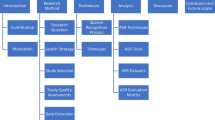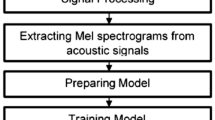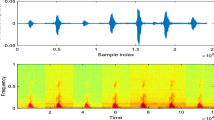Abstract
Speech is the primary entity for personal communication however ambient quality generally impairs speech signal quality and understanding of communication. Therefore, it is required that the distorted speech signal be improved in its quality and comprehension. In the field of speech processing, great efforts have been made to develop speech enhancement techniques that restore speech signals by reducing the amount of interfering noise. This work focuses on a critical analysis of single channel speech enhancement technique that performs noise reduction through spectral subtraction based on minimal statistics. Minimal statistics implies estimating the power spectrum of a non-standard noise signal by avoiding the problem of detecting speech activity by finding the smallest value for a smooth power spectrum of a noisy speech signal. The performance of the spectral subtraction method is evaluated over a wide range of noise types with varying sound levels using single channel speech data. This estimator is used to find the optimal value for the method parameter and improve this algorithm to make it more suitable for voice communication purposes. The system can be implemented in MATLAB and also validated against a variety of performance measures and various improvements in signal-to-noise ratio (SNRI) and spectral distortion (SD). This approach provides effective speech enhancement in SNRI and SD performance metrics. A comparatively new method has been proposed in this paper named Spectral Statistics Based on Minimum Statistics (SSBMS) which customarily follows the transient noise and provides a better response in the process of speech enhancement.






Similar content being viewed by others
Data Availability
The datasets generated during and/or analysed during the current study are available in the NOIZEUS repository and IEEE DataPort which is a Dataset Storage and Dataset Search Platform. [1. https://ecs.utdallas.edu/loizou/speech/noizeus/ and 2. https://ieee-dataport.org/keywords/speech-dataset]. For the experimental purpose, the clean speech samples have been taken from NOIZEUS corpus, which is a publicly available speech database and is usually used for benchmark experiments. Data openly available in a public repository that issues datasets with DOIs and Data derived from public domain resources.
Code Availability
NA.
References
Boll, S. (1979). Suppression of acoustic noise in speech using spectral subtraction. IEEE Transactions on Acoustics, Speech, and Signal Processing, 27(2), 113–120.
McAulay, R., & Malpass, M. (1980). Speech enhancement using a soft-decision noise suppression filter. IEEE Transactions on Acoustics, Speech, and Signal Processing, 28(2), 137–145.
Ghorpade, K., & Khaparde, A. (2022). Single channel speech enhancement using evolutionary algorithm with Log-MMSE. ASEAN Engineering Journal, 12(1), 83–91.
Yang, Y., Zhang, H., Zhang, X., & Zhang, H (2022) Alleviating the Loss-Metric mismatch in supervised single-channel speech enhancement, In: ICASSP 2022–2022 IEEE International Conference on Acoustics, Speech and Signal Processing (ICASSP), IEEE, pp. 6952–6956.
Ephraim, Y., & Malah, D. (1984). Speech enhancement using a minimum-mean square error short-time spectral amplitude estimator. IEEE Transactions on Acoustics, Speech, and Signal Processing, 32(6), 1109–1121.
Cappe, O. (1994). Elimination of the musical noise phenomenon with the Ephraim and Malah noise suppressor. IEEE Transactions on Speech and Audio Processing, 2(2), 345–349.
Martin, R. (2005). Speech enhancement based on minimum mean-square error estimation and super-gaussian priors. IEEE Transactions on Speech and Audio Processing, 13(5), 845–856.
Gerkmann, T., & Hendriks, R. C. (2012). Unbiased MMSE-based noise power estimation with low complexity and low tracking delay. IEEE Transactions on Audio, Speech, and Language Processing, 20(4), 1383–1393.
Wang, D., & Lim, J. (1982). The unimportance of phase in speech enhancement. IEEE Transactions on Acoustics, Speech, and Signal Processing, 30(4), 679–681.
M. R. Weiss, A. E. Aschkenasy, and T. W. (1974) Parsons, Study and development of the intel technique for improving speech intelligibility, Nicolet Scientific Corp., Tech. Rep.
Paliwal, K., Wojcicki, K., & Shannon, B. (2011). The importance of phase in speech enhancement. Speech Communication, 53(4), 465–494.
P. Mowlaee and R. Martin (2012) On phase importance in parameter estimation for single-channel source separation. In: Proceedings International Workshop on Acoustic Signal Enhancement, pp. 1–4.
Mowlaee, P., & Saeidi, R. (2013). Iterative closed-loop phase-aware single-channel speech enhancement. IEEE Signal Processing Letter, 20(12), 1235–1239.
Mowlaee, P., & Kulmer, J. (2015). Phase estimation in single-channel speech enhancement: Limits-potential. IEEE Transactions on Audio, Speech, and Language Processing, 23(8), 1283–1294.
Mowlaee, P., & Kulmer, J. (2015). Harmonic phase estimation in single-channel speech enhancement using phase decomposition and SNR information. IEEE Transactions on Audio, Speech, and Language Processing, 23(9), 1521–1532.
Gerkmann, T., & Krawczyk, M. (2013). MMSE-optimal spectral amplitude estimation given the STFT-phase. IEEE Signal Processing Letter, 20(2), 129–132.
Gerkmann, T. (2014). Bayesian estimation of clean speech spectral coefficients given a priori knowledge of the phase. IEEE Transactions on Signal Processing, 62(16), 4199–4208.
Krawczyk, M., & Gerkmann, T. (2014). STFT phase reconstruction in voiced speech for an improved single-channel speech enhancement. IEEE Transactions on Audio, Speech, and Language Processing, 22(12), 1931–1940.
Krawczyk-Becker, M., & Gerkmann, T. (2016). On MMSE-based estimation of amplitude and complex speech spectral coefficients under phase-uncertainty. IEEE Transactions on Audio, Speech, and Language Processing, 24(12), 2251–2262.
Krawczyk-Becker, M., & Gerkmann, T. (2016). An evaluation of the perceptual quality of phase-aware single-channel speech enhancement. The Journal of the Acoustical Society of America, 140, 364–369.
Deville, Y., Gannot, S., Mason, R., Plumbley, M. D., & Ward, D. (2018). A study on the benefits of phase-aware speech enhancement in challenging noise scenarios. In Y. Deville, S. Gannot, R. Mason, & M. D. Plumbley (Eds.), Latent Variable Analysis and Signal Separation (pp. 407–416). Cham: Springer International Publishing.
Mowlaee, P., Saeidi, R., & Stylianou, Y. (2016). Advances in phase-aware signal processing in speech communication. Speech Communication, 81, 1–29.
Gerkmann, T., Krawczyk-Becker, M., & Roux, J. L. (2015). Phase processing for single channel speech enhancement: History and recent advances. IEEE Signal Processing Magazine, 32(2), 55–66.
Krawczyk-Becker, M., & Gerkmann, T. (2018). On speech enhancement under PSD uncertainty. IEEE Transactions on Audio, Speech, and Language Processing, 26(6), 1144–1153.
Xu, Y., Du, J., Dai, L., & Lee, C. (2015). A regression approach to speech enhancement based on deep neural networks. IEEE Transactions on Audio, Speech, and Language Processing, 23(1), 7–19.
M. Kolbaek, Z. Tan, and J. Jensen, (2018) Monaural speech enhancement using deep neural networks by maximizing a short-time objective intelligibility measure.
Funding
There are no funding Sources of this manuscript.
Author information
Authors and Affiliations
Contributions
Ms. Monika Gupta has prepared this manuscript under the guidance of Dr. R.K. Singh and Dr. Sachin Singh.
Corresponding author
Ethics declarations
Conflicts of interest
The authors declare that they have no conflict of interest among them.
Additional information
Publisher's Note
Springer Nature remains neutral with regard to jurisdictional claims in published maps and institutional affiliations.
Rights and permissions
Springer Nature or its licensor holds exclusive rights to this article under a publishing agreement with the author(s) or other rightsholder(s); author self-archiving of the accepted manuscript version of this article is solely governed by the terms of such publishing agreement and applicable law.
About this article
Cite this article
Gupta, M., Singh, R.K. & Singh, S. Analysis of Optimized Spectral Subtraction Method for Single Channel Speech Enhancement. Wireless Pers Commun 128, 2203–2215 (2023). https://doi.org/10.1007/s11277-022-10039-y
Accepted:
Published:
Issue Date:
DOI: https://doi.org/10.1007/s11277-022-10039-y




